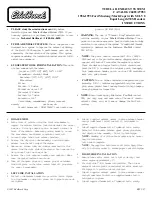
DRIVE (D): This position is for normal driving. It
provides the best fuel economy for your vehicle. If
you need more power for passing, and you are:
•
Going less than about 35 mph (55 km/h), push
your accelerator pedal about halfway down.
•
Going about 35 mph (55 km/h) or more, push
the accelerator all the way down.
By doing this, the vehicle shifts down to the
next gear and has more power.
Downshifting the transmission in slippery road
conditions could result in skidding, see “Skidding”
under Loss of Control on page 371
DRIVE (D) can be used when towing a trailer,
carrying a heavy load, driving on steep hills, or for
off-road driving. You may want to shift the
transmission to THIRD (3) or, if necessary, a lower
gear selection if the transmission shifts too often.
If your vehicle has the Allison Transmission
®
, it will
shift into first range when DRIVE (D) is selected.
As vehicle speed increases, the transmission
will upshift automatically through each available
range up to SIXTH (6). As the vehicle slows,
the transmission will downshift automatically.
The Allison Transmission
®
uses a shift stabilization
feature that adjusts the transmission shifting to
the current driving conditions in order to reduce
rapid upshifts and downshifts. This shift
stabilization feature is designed to determine
before making an upshift if the engine will be able
to maintain vehicle speed by analyzing things
such as throttle position, vehicle load, and
hill grade. If the shift stabilization feature
determines that current vehicle speed cannot be
maintained, the transmission does not upshift
and instead holds the current gear. In some cases,
this may appear to be a delayed shift, however
the transmission is operating normally.
The Allison Transmission
®
also uses adaptive shift
controls. Adaptive shift controls continually
compares key shift parameters to pre-programmed
ideal shift conditions. The Allison Transmission
®
constantly makes adjustments to improve vehicle
performance according to the way the vehicle is
being used, such as with a heavy load. During this
adaptive shift controls process, some shifts may
feel different as the transmission determines
optimum settings for a particular shift.
139
Summary of Contents for Silverado Classic 2007
Page 6: ...These are some examples of symbols that may be found on the vehicle 6 ...
Page 106: ... NOTES 106 ...
Page 207: ... NOTES 207 ...
Page 354: ... NOTES 354 ...
Page 484: ...When you open the hood on the 8 1L V8 engine here is what you will see 484 ...
Page 606: ...606 ...
Page 634: ...Engine Drive Belt Routing A Air Conditioning Compressor V6 Engines V8 Engines 634 ...
Page 660: ... NOTES 660 ...
















































